 |
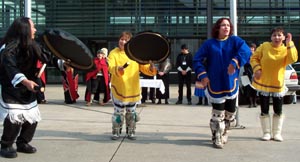
|
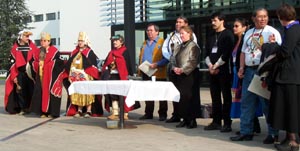
|
Plenary:
|
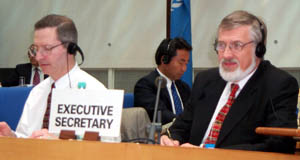 |
Dr.
Bo Wahlstrom (on the right), speaking on behalf of the Secretariat,
outlined the development of the annexes on information requirements
for listing of substances, noting the high degree of consensus achieved
at previous meetings. |
|
Chair Buccini,
Jim Willis (UNEP Chemicals) and Wahlstrom going over a submission
for amendment. Note the Inuit statue on the left, given to Buccini
at POPs INC-2.
|
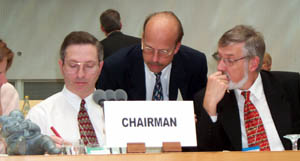 |
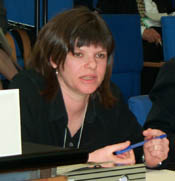 |
On the information requirements that parties proposing additional
POPs are to provide (Annex D), the EU (pictured here) specified that
this information be "on the properties of the substance and its transformation
products, where relevant." The US preferred information "on the substance,
and its transformation products, where appropriate," and delegates
agreed. |
| Peter
Hinchcliffe (UK), Chair of the contact group on the management and
disposal of wastes, noted agreement on the majority of text despite
deeply held positions. He said the remaining brackets relate mainly
to technical detail, and can be resolved easily. He introduced the
revised text forwarded by the contact group, which, inter alia, streamlines
stockpiles and wastes into one provision, and, regarding disposal,
calls for consistency with the Basel Convention, where appropriate.
|
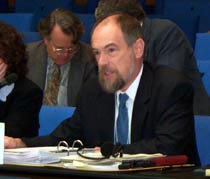 |
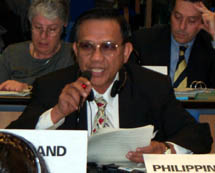 |
Concerning "cooperate to" provide technical assistance, the PHILIPPINES
called to delete "cooperate to," noting that this, "upon request,"
and similar language is designed to allow developed countries to evade
their responsibilities in eliminating POPs. |
|
KUWAIT supported provision for destruction of stockpiles of POPs and
a prohibition on their transit. |
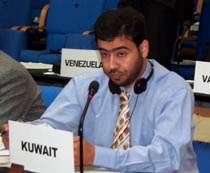 |
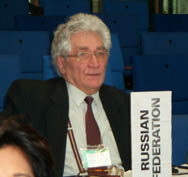 |
The
RUSSIAN FEDERATION noted the role of volatility in secondary emissions,
and stressed its inclusion in the evaluation of potential for long-range
transport. |
|
|
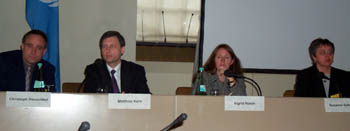 Side-Event:
GTZ presentation on POPs-related projects Side-Event:
GTZ presentation on POPs-related projects
Deutsche Gesellschaft
für technische Zusammenarbeit (German Technical Cooperation, GTZ)
held a lunch-time gathering to brief INC-4 participants on some
of its projects to implement measures on the reduction or elimination
of POPs. Ingrid Hoven, Ministry of Economic Cooperation and Development
(BMZ, second from the right)
introduced Germany's policy on international cooperation in the
area of chemicals management. Matthias Kern, GTZ (second from
the left), discussed a project assessing dioxin and furan emissions
in Thailand. Christopher Heuschkel, GFA International Health Consultants
(far left), outlined the GTZ's experiences in malaria control
and highlighted the successful results of a project to promote the
use of pyrethroid-treated bed nets and curtains. Suzanne Scholaen,
GTZ, moderated the panel. For
more information, please consult the GTZ
web site.
|
Evening
reception |
| The
German government held a reception for INC-4 participants at the Museum
of Modern German History. |
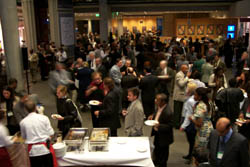 |
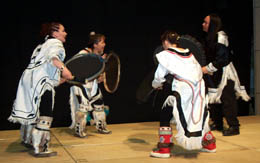 |
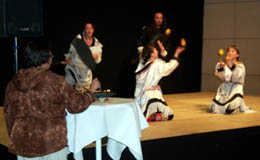 |
| INC
participants were entertained by members of the Asquarniit (Inuit,
above) and Tagish (below) dance groups from Northern
Canada. |
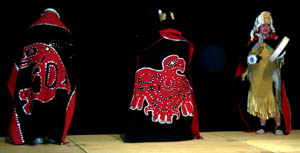 |
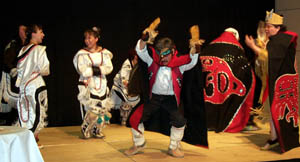 |
| Bob
Charlie, Chief of the Champagne and Aishihik First Nations, presented
the Government of Germany with a plaque to thank it for its hospitality
and support for the people of the Arctic region. |
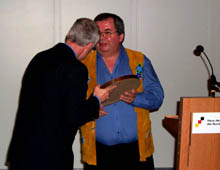 |
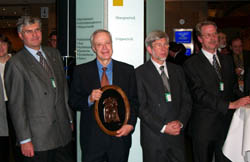 |
The
German delegation with their new plaque, which will soon be hanging
in the halls of the Ministry of Environment in Berlin. |
|